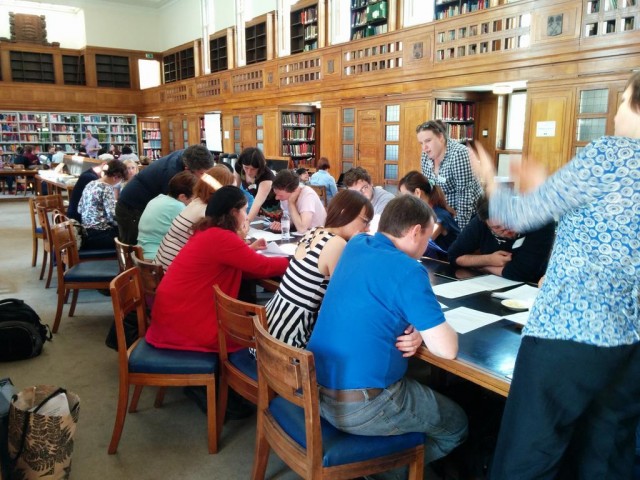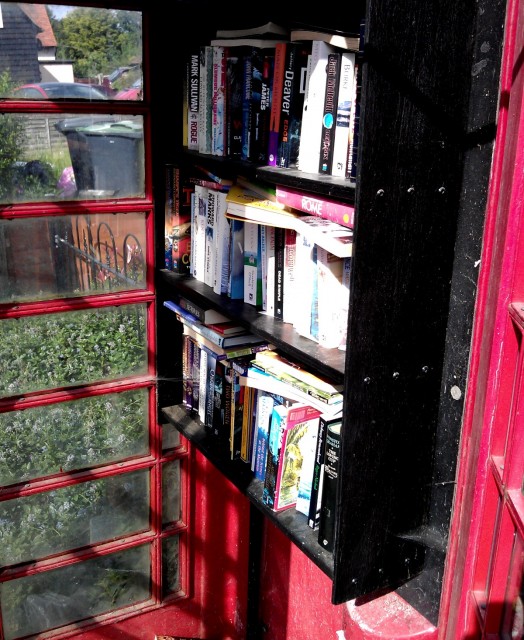Last weekend I attended the #radlib15 event organised by Radical Librarians Collective (RLC) in Huddersfield. I wanted to draw some threads between sessions I attended, and follow up on a few things left unsaid on the day. RLC has come a long way in a few years and is evolving, but importantly it has maintained a safe space for discussions in LIS that are not happening elsewhere. My thanks to the organizers at RLC for their work.
Professional confidence and professional identity
During the day, I felt two discussions on impostor syndrome and team working were linked by points made about professional confidence and identity, questions about radical perspectives on management, and ideas about the presentation of an authentic self.
Elly O’Brien recently wrote a compelling article problematizing impostor syndrome and professional confidence which helped inform the impostor syndrome session, with Elly’s article referenced at the beginning. I agree with Elly’s points about the unhelpful librarian tendency towards self-deprecation, and I think Kevin nailed it when he called out this “syndrome” as a political creation exerting power on the subject:
Impostor syndrome: a political creation that limits & controls subjects. Don’t let ’em win. Do things. Value yourself. Rock it. #radlibs2015
— Kevin Sanders (@moananddrone) July 4, 2015
About lacking confidence, a point was raised in discussion about whether there is a psychological disconnect between our presentation of identity online, and our true or authentic selves:
The disconnect between who you are and who you present yourself to be (online) – is this the cause of the lack of confidence? #radlib15
— Radical Librarians (@RadicalLibs) July 4, 2015
Psychological disconnect between the marketised version of ourselves that we put out to get jobs and the real version of ourselves #radlib15
— Simon Barron (@SimonXIX) July 4, 2015
I think Simon’s point on the marketized self is good, and I would expand on it and generalize from it. From a Marxian viewpoint anyone who is worker is compelled to sell labour as a commodity, representing a market relationship between the self’s potential for labour (labour power, Marx’s Arbeitskraft) formed from our own living bodies, and capital. In a sense under capital that marketized self is no more or less than one’s real self as it is reflected and understood by capital. This situation is deeply problematic.
Performativity in online identity
On Twitter, Chris followed this with a point and a question about authenticity in our online selves:
Which is where authenticity plays a big role – are we authentic in our online/applicant selves? https://t.co/JSvvtmtUEc
— Chris Banks (@ChrisBanks) July 4, 2015
I’ve been thinking about a similar question about online identity since I read Ned’s blog post about creating online identity last year, especially his points about “consistent voice” and advice on not “adjusting who you are for other people”. Here I draw a line to the session on teams and teamwork and library managers as a potentially radical subject, relating them using Judith Butler’s concept of performativity.
Butler originally applied her Foucauldian reading of performativity in developing an analysis of gender, arguing that identity can be brought to life or made real by repeated and consistent use of authoritative speech, as:
There is no gender identity behind the expressions of gender; […] identity is performatively constituted by the very “expressions” that are said to be its results.
(Butler, 1999 p.33)
There is a subtle point here. Butler is not simply suggesting that if we talk as if we have identity x, we will have identity x, as in the “fake it till you make it” suggestion that was raised in the impostor syndrome session, but that performativity is:
[T]hat reiterative power of discourse to produce the phenomena that it regulates and constrains
(Butler, 2014 p.2)
I argue online identities of LIS workers are performative in the way that our use of language itself reifies, by repetition of authoritative speech, those identities that we create online rather than being something authentically constructed or a mere result of “being oneself”. For example, the identity of “an efficient, competent subject librarian”, or “a grounded, authentic manager”, created exactly by the discourse of those individuals on social media platforms like Twitter. I would expand this to include identities we create as managers, in that management is fundamentally performative: expressing power by a mode of authoritative speech, a case of actions embodied in “Doing things with words” (Learmonth, 2005).
On the broader question raised of library management as potentially radical, I have written before about authenticity in management and leadership at Radical Library Camp (the original RLC unconference in 2013) where I facilitated a discussion. In hindsight I’m not satisfied with that perspective, because I don’t see much difference between what I described and straightforward good management.
Instead I think we need to approach management and leadership from a critical perspective, and that there is space for a critical management studies (CMS) view of library management as Kenny Garcia suggested on the #radlib15 hashtag. CMS is something like a critique of management informed by Frankfurt School critical theory; to provide LIS focus I’d add in critical perspectives on information management and information literacy, and perhaps a Marxian lens to analyze information as a commodity in a marketized society. For much more development of the latter, I recommend Lawson, Sanders, and Smith (2015).
This is something I’m very interested in developing in future, so if you are interested in a CMS plus LIS mashup let me know.
References
Butler, J. (1999) Gender trouble: feminism and the subversion of identity. Reprint, Abingdon: Routledge.
Butler, J. (2014) Bodies that matter: on the discursive limits of “sex”. Reprint, Abingdon: Routledge.
Lawson, S., Sanders, K, and Smith, L. (2015) ‘Commodification of the information profession: a critique of higher education under neoliberalism’, Journal of Librarianship and Scholarly Communication, 3(1), eP1182. doi:10.7710/2162-3309.1182
Learmonth, M. (2005) ‘Doing things with words: the case of “management” and “administration”’, Public Administration 83(3), pp. 617–637. doi:10.1111/j.0033-3298.2005.00465.x
Photo credit
‘Sunset Flowers. Huddersfield‘ header image by Flickr user Michael Podger. License CC BY.





